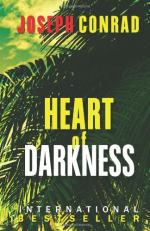|
This section contains 1,108 words (approx. 4 pages at 300 words per page) |

|
Contradicting Symbolism in Joseph Conrad's "Heart of Darkness"
Summary: Explains the significance of darkness versus light (black versus white) in the Joseph Conrad novel, "Heart of Darkness." Uses outside commentaries as well as supporting documentation from the story. (
Joseph Conrad utilizes several important literary techniques throughout his story Heart of Darkness. One predominant method of his storytelling is the use of contrasting sensory imagery between black and white and altering the symbolism the colors entail. This theme is clearly prevalent when we read of Marlow's childhood dreams and when comparing and contrasting the Africans, the Europeans, and the corruption of the ivory trade. Generally, Africa and Africans are described in terms of blackness, symbolic of darkness, evil, and corruption. On the other hand, Europe and Europeans are defined in terms of white, representative of innocence and purity. These images are essential in proving the dominant theme of good versus evil and in Conrad's unconventional reversal of the true colors of blacks and whites.
Subsequent to the introduction of his journey, Marlow explains the significance of his map. "It ceased to be...a white patch for a...
|
This section contains 1,108 words (approx. 4 pages at 300 words per page) |

|


